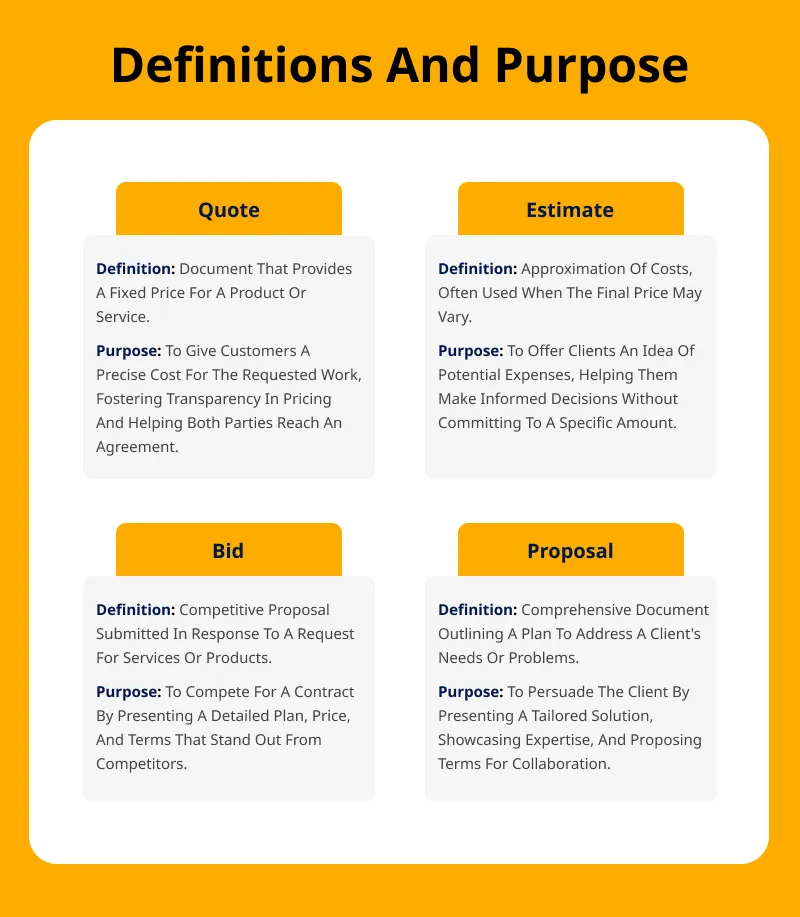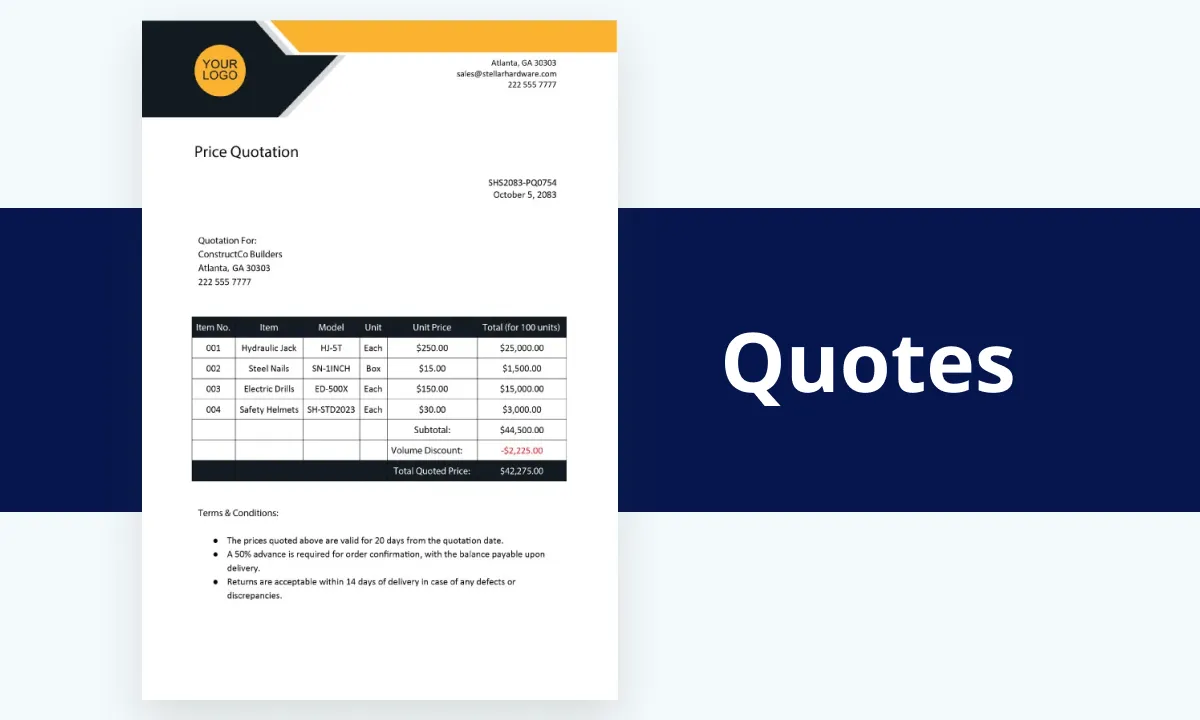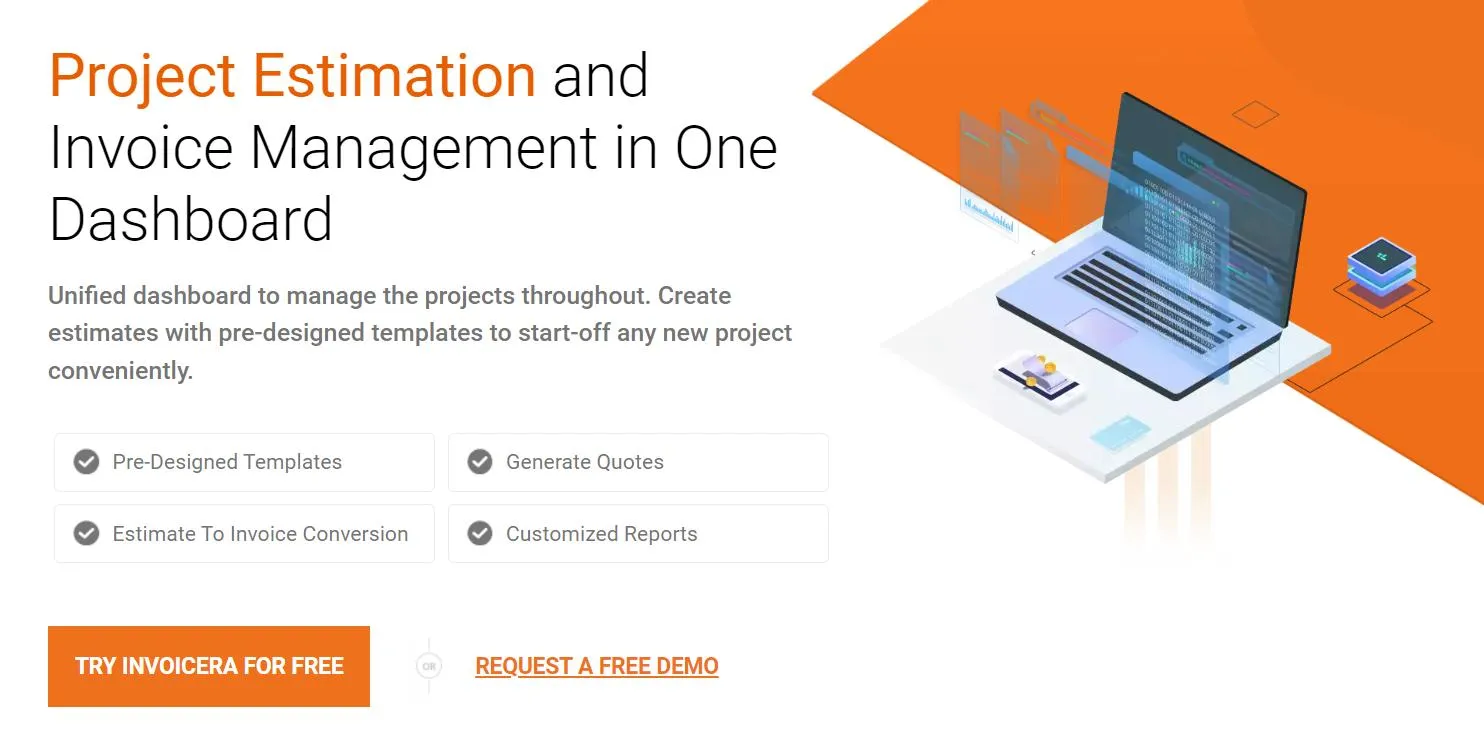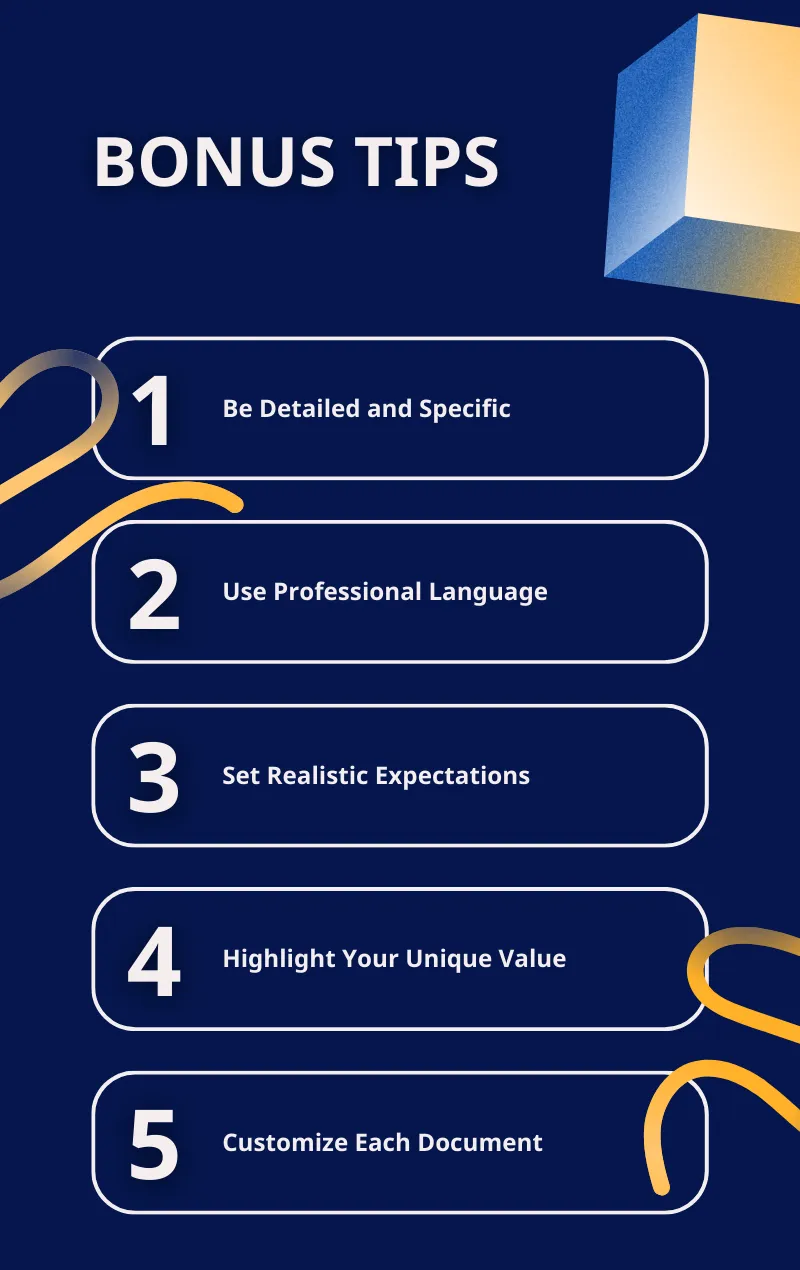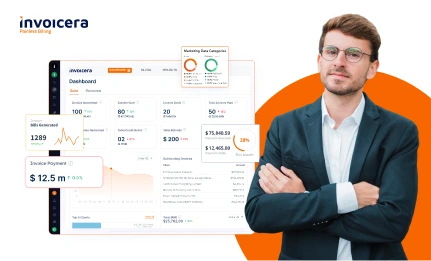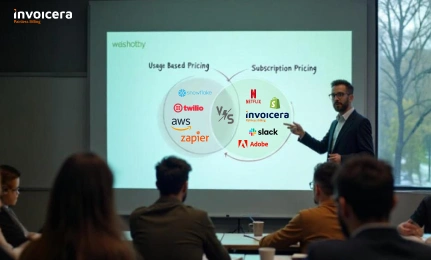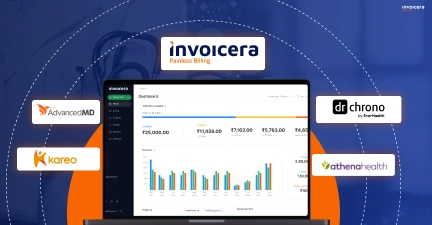Confused between quotes, estimates, bids, and proposals?
Well! Not only you, but many get.
All the terms sound similar, and that’s why we often make the mistake of using the wrong term in the wrong place.
Bids, proposals, quotes, and estimates have different meanings and their usage differs for every industry & business.
If you are a business, using the wrong terminology can negatively impact the reputation, and might create trust issues with clients.
So, wrong documentation is a Big No for any business.
To help you out, we have clearly explained the differences between quotes, estimates, bids, and proposals in this blog post.
Let’s begin.
Quotes
A quote or a quotation provides a fixed price for a specific product or service that a business offers.
It outlines the terms and conditions of the offer and is typically provided to a potential client or customer. A quote serves as a legally binding document and communicates the cost of a particular job or purchase.
They are crucial in various industries, including construction, consulting, retail, etc.
When To Use Quotes?
Quotes are primarily used when an interested customer asks or requests pricing information for any product/service.
They are apt for situations where the price can be determined with reasonable certainty and there is a clear understanding of what the customer requires.
Here are some common scenarios when quotes are used:
- Customized Services: If your business offers services that vary based on the client’s needs, such as consulting, marketing, or web design, providing a quote is essential. It allows you to specify the exact scope of work and its associated cost.
- One-time Sales: When selling high-value items or unique products, like custom-made furniture or specialized machinery, a quote helps provide a clear price to the customer.
- Small-Scale Projects: Quotes are also provided for small projects like home repairs, whitewashing, or any other little work.
- B2B Transactions: Quotes are also commonly used in B2B transactions to negotiate for better pricing for goods and services.
Advantages Of Using Quotes
Here are a few advantages of using quotes in your business:
- Transparency: They give a clear idea about the cost of products or services, maintaining transparency at every step.
- Legal Protection: A well-created quote is legally binding. It outlines the terms and conditions, protecting you and the customer in case of disputes or misunderstandings.
- Professionalism: Providing quotes demonstrates professionalism and seriousness in business dealings. It shows that you take your customers’ needs seriously and are committed to delivering value.
- Accurate Pricing: Quotes ensure that your pricing is accurate and tailored to the customer’s specific requirements. This prevents surprises related to hidden costs or unexpected charges.
Create Quotes With Invoicera
Invoicera, an online invoicing and billing software, offers numerous features to simplify the process of creating and managing quotes for your business:
- Customizable Templates: Invoicera provides custom templates for quotes, allowing you to brand them with your logo and personalize them to match your business’s identity.
- Itemized Breakdown: To properly understand the pricing structure, you can provide your customers with a comprehensive summary of the goods or services in the quotes.
- Instant Quotes: You can quickly generate quotes with Invoicera, which is especially helpful when responding to customer inquiries quickly.
- Quote Tracking: You can track the status of your quotes, making it easy to follow up with customers and convert quotes into invoices once they’re accepted.
- Cloud-Based Access: With Invoicera, you can access your quotes from anywhere, making it convenient for you and your customers.
Estimates
An estimate is a critical document in business, particularly when providing clients with an approximate cost for goods or services. Given the available information at the time, it is a professionally prepared guess at the expected cost of a project or product.
Estimates serve as a preliminary assessment and often act as a starting point for negotiations between a business and its clients or partners.
When To Use Estimates?
Estimates are typically employed in various scenarios:
- Project Bidding: When bidding on a project, providing a detailed estimate is essential. It helps interested clients understand what to expect regarding costs and scope.
- Customized Services: For businesses that offer customized services, such as construction, web design, or consulting, providing estimates is a common practice. It gives clients an idea of how much their unique project will cost.
- Long-Term Contracts: Estimates can project expenses over time for businesses with long-term contracts, like maintenance or subscription-based services.
- New Business Ventures: If you’re exploring a new business venture, creating an estimate can help you gauge the potential costs and returns.
Advantages Of Using Estimates
Estimates offer several advantages for your business and your clients:
- Transparency: Estimates provide transparency and clarity, helping clients understand the expected costs and scope of work.
- Client Confidence: They instill confidence in your professionalism and commitment to delivering quality services.
- Budgeting: Clients can use estimates to ensure they have the necessary funds.
- Avoiding Misunderstandings: By setting clear expectations, estimates can prevent misunderstandings and disputes later.
Create Estimates With Invoicera
Invoicera offers a range of features to simplify creating and managing estimates:
- E-Mail Estimates
You can easily send estimates and get approvals in simple steps. This software lets you save all your data in one cloud-based software.
- Convert Estimates To Invoices
You can quickly convert estimates into invoices with Invoicera. It helps you get paid faster with quick estimate approvals and faster invoicing.
- Create Duplicate Estimates
You can easily create, save, and create duplicate estimates and use them with multiple clients with Invoicera.
- View Status
You can track all estimates in one dashboard and view the actual status of each estimate for further actions with simplified estimate software.
Bids
A bid is a formal and structured document outlining a detailed project, contract, or job proposal.
It serves as a competitive offer or a response to a request for proposal (RFP). Bids are typically submitted by contractors, vendors, or service providers to potential clients or organizations looking to acquire specific services or products.
A bid is different from an estimate or quote because it includes a complete plan that specifies the cost of the project as well as the materials, schedule, and methods of execution.
This degree of information is essential for clients to determine which vendor or contractor best suits their needs.
When To Use Bids?
Bids are generally used when a client or organization seeks to evaluate multiple options and select the most suitable one. Common scenarios where bids are employed include:
- Construction Projects: When clients require construction companies to submit bids outlining their approach, costs, and timeline for completing a construction project.
- Government Contracts: Government agencies often request bids from businesses to ensure a fair and transparent selection process.
- Large-scale Services: Bids are used for procuring services like IT consulting, marketing, or any service that demands a detailed plan and cost breakdown.
- Competitive Tenders: In situations where multiple vendors are vying for a project or contract.
Advantages Of Using Bids
Using bids offers several advantages:
- Comprehensive Information: Bids provide a detailed roadmap for the project, allowing clients to make well-informed decisions.
- Competitive Pricing: The competitive nature of bids often results in cost savings, as vendors strive to offer the best price.
- Transparency: The bid process is typically transparent, ensuring a fair evaluation of proposals.
- Legal Protection: Bids often come with legal implications that protect both the client and the vendor, reducing the risk of disputes.
Proposals
A proposal is a formal document outlining a detailed plan or offer presented to a potential client or business partner.
It is a persuasive tool created to highlight your company’s abilities, attend to a particular need, and show how your solutions can meet the client’s needs successfully.
Comprehensive details like a project scope, budget, schedule, and several terms and conditions are frequently included in proposals.
When To Use Proposals?
Proposals are typically used in more complex and substantial business interactions requiring a detailed solution. Here are some common scenarios in which you might use proposals:
- Request for Proposals: RFPs compete for opportunities when a client or organization invites companies to offer proposals to bid on a project or contract.
- Customized Solutions: When your client has specific requirements that a standard product or service cannot meet, a proposal helps you to create a solution to their needs.
- Long-term Contracts: For projects or partnerships that involve extended timeframes, ongoing services, or substantial financial commitments, proposals provide a comprehensive overview of the engagement.
- Government Contracts: Government agencies often require detailed proposals to ensure transparency and adherence to specific guidelines and regulations.
Advantages Of Using Proposals
Using proposals in your business dealings offers several key advantages:
- Professionalism: Proposals demonstrate your commitment to providing a well-thought-out and professional solution. This can instill confidence in potential clients.
- Clarity: Proposals provide a clear and detailed overview of your offerings and ensure that both parties completely understand the project scope and expectations.
- Customization: Proposals allow you to tailor your offerings to the client’s particular needs, making it a highly personalized document.
- Competitive Edge: A well-created proposal distinguishes you from competitors by showcasing your unique value proposition and expertise.
- Legal Protection: Proposals can include critical legal terms and conditions that protect your interests and define the terms of the engagement.
Send Proposals With Invoicera
Create and manage proposals with Invoicera, embracing the below features:
- Customization: Users can easily customize these templates to align with their brand identity and tailor proposals to specific client needs.
- Electronic Signatures: Invoicera enables clients to electronically sign proposals electronically, reducing the time and effort required for the approval process.
- Version Control: Track changes and revisions with version control, helping you maintain a record of proposal modifications.
- Notification And Reminders: Set reminders for proposal follow-ups to ensure you take advantage of every opportunity to engage with potential clients.
Comparative Analysis
To facilitate your understanding, let’s look at the differences between quotes, estimates, bids, and proposals using a comparative table:
| Aspect | Quote | Estimate | Bid | Proposal |
| Detail | Typically provides a price for a specific product. | Generally offers an approximate cost for a project or service. | Offers detailed pricing for a project with specifications. | Contains a comprehensive plan for a project or service. |
| Legal Implications | Mostly non-binding and subject to change. | Depending on the jurisdiction and language used, it can be binding or non-binding. | Depending on the jurisdiction and language used, it can be binding or non-binding. | Depending on the jurisdiction and language used, it can be binding or non-binding. |
| Commitment | Low commitment, easily changed or revoked. | Moderate commitment, with potential changes based on further information. | High commitment, indicating a serious intention to proceed with the project. | High commitment, indicating a serious intention to proceed with the project. |
When To Use One Over The Other
Knowing when to use each document is crucial to conducting business effectively. Here’s a brief guide on when to choose one over the other:
Quotes: Use quotes when you want to provide a quick and straightforward price for a specific product or service. They are ideal for transactions where you want to give customers an immediate cost estimate.
Estimates: Estimates are best suited for projects where the final cost is uncertain or could change based on further information. They are more flexible and allow for adjustments as more details become available.
Bids: Bids are appropriate when competing for a project or contract. They indicate your commitment to taking on the project and often involve a more detailed work specification and pricing.
Proposals: When you want to present a carefully planned solution and demonstrate your dedication to the project, use proposals.
Bonus Tips
Tips for creating effective quotes, estimates, bids, and proposals:
- Be Detailed and Specific: Provide clear, detailed information in your documents. Include itemized lists, quantities, prices, and any other relevant details. This will help clients understand what they are paying for and minimize misunderstandings.
- Use Professional Language: Maintain a professional tone and keep the language clear & concise. Avoid technical terms that clients may not understand. Your goal is to make your documents accessible and easy to comprehend.
- Set Realistic Expectations: Ensure that the content of your documents aligns with what you can deliver. Overpromising can lead to disappointment and mistrust if you can’t meet expectations.
- Highlight Your Unique Value: Showcase what sets your business apart. Explain why clients should choose you over competitors. This can be a unique selling proposition, exceptional customer service, or your track record of delivering quality work.
- Customize Each Document: Tailor your quotes, estimates, bids, and proposals to the specific needs of each client. Generic templates may not address all the client’s requirements, so personalize them accordingly.
Factors To Consider In Each Case:
While creating quotes, estimates, bids, and proposals, there are specific factors to consider for each type:
- For Quotes, emphasize pricing details and offer a fixed cost for your products or services.
- In Estimates, focus on providing a rough cost approximation, indicating that the final amount may vary.
- Bids should showcase your competitive pricing, skills, and qualifications to win a contract.
- In Proposals, emphasize your value and how your solutions will address the client’s unique needs.
How to enhance professionalism and clarity:
To enhance professionalism and clarity in your documents, follow these practices:
- Use Templates: Consider using professional templates like those offered by Invoicera. These templates can ensure a consistent and polished look for your documents.
- Proofread and Edit: Check for grammar and spelling errors. A well-edited document reflects professionalism and attention to detail.
- Include Visuals: Use charts, graphs, or images to illustrate key points and make your documents visually appealing and easy to understand.
- Provide Contact Information: Ensure that your contact information is clearly visible so that clients can reach out with questions or clarifications.
- Use Digital Signatures: Implement digital signatures for added security and professionalism, demonstrating your commitment to document authenticity.
Legal and Ethical Considerations
Using quotes, estimates, bids, and proposals comes with specific legal and ethical responsibilities. Understanding and adhering to these obligations is important, which may vary by jurisdiction and industry.
Legal considerations can include compliance with pricing regulations and tax laws, while ethical considerations might involve maintaining honesty and transparency.
Misusing or misinterpreting legal terms could lead to legal problems and can cause damage to your reputation, losing valuable clients.
Invoicera can help ensure that your documents comply with legal requirements and ethical standards, reducing the risk of adverse consequences.
Conclusion
Each of the above documents serves a distinct purpose and carries its own set of implications.
You can navigate negotiations, contracts, and client relationships more effectively by grasping these differences.
Moreover, a valuable tool like Invoicera can significantly simplify the process of creating and managing these documents.
It offers a versatile platform that caters to your needs, whether you’re dealing with quotes, estimates, bids, or proposals.
Invoicera enables you to efficiently produce professional, accurate documents, helping you save time and present your business in the best possible light.
FAQs
Is it essential to use these documents in business transactions?
While they are not always mandatory, using these documents is a best practice in business. They provide clarity and protection for both parties and help establish professionalism in your dealings.
Can Invoicera help with legal compliance in these documents?
Yes, Invoicera offers features that ensure legal compliance in your documents. It helps you create and manage quotes, estimates, bids, and proposals in accordance with the law.
Is Invoicera suitable for businesses of all sizes?
Yes, Invoicera is designed to cater to businesses of all sizes, from freelancers and small businesses to larger enterprises. It offers scalable solutions to meet your specific needs.
Can Invoicera integrate with other business software and tools?
Yes, Invoicera provides integration with various other software and tools to streamline your business processes, including CRM, accounting, and payment gateways.
How can Invoicera help in document management?
Invoicera offers a user-friendly platform to create, store, and manage quotes, estimates, bids, and proposals. It helps maintain an organized record of your documents for easy access and reference.

